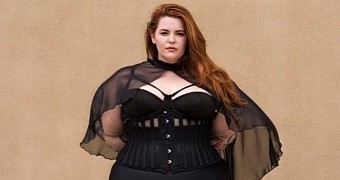Since January this year, when she signed with plus-size modeling agency MiLk and became the heaviest plus-size model ever signed, the name Tess Holliday has been thrown around in conversation a lot. The number one reason this happened is that she’s gorgeous. The second is that she’s overweight.
Tess is a US size 22, in an industry where “plus-size” is usually no higher than a US size 16, and in a world in which the average dress size for women is US 14. She is a large woman, and because she’s now a legitimate model and being hailed as a role model online, she’s also accused of “promoting” an unhealthy lifestyle by opposing an obese figure to the stick-thin figures of “traditional” models.
Call her fat, Tess doesn’t mind
The reasoning of those who criticize Tess as a model and this new tendency to embrace progressively heavier girls in fashion, is this: stick-thin, size 0 to 4 girls are unhealthy role models for impressionable young women and girls, because they have figures attainable only through strict dieting and, occasionally, even starvation.
However, having a size 22 girl as a model doesn’t reflect reality either: because the average dress size in the US is a 14, you can’t have a girl as Tess be representative of the regular woman. She is overweight and she is probably unhealthy as well, so she shouldn’t be on billboards and in fashion magazines, because it sends the message that a body like hers is ok to have.
In other words, Tess is guilty of being too fat to model, to put it bluntly.
In her latest interview with The Guardian, she concedes: yes, she’s fat and she knows it. However, just being fat isn’t enough of a reason to deny her a career as a model.
“To me it’s just a word, but it wasn’t until I discovered the body positive community that I became OK with it. I’ve been called fat my whole life,” she says. “I am fat, so it’s kind of silly to get mad about it. [But], you know, no one is coming at celebrities for smoking two packs of cigarettes. Or people who post a photo with their drink at the end of the day. So why is it OK to do that to me? Life is [expletive]-y, so why would you judge somebody for dealing with it in the best way they can?”
No apologies
Tess is a comfort eater and she has no intention of apologizing for it. Nonetheless, she insists that she’s not the kind to throw all caution out the window: if you think she’s gotten to this weight by eating around the clock, you’re wrong.
As she puts it, if she’s had a long day and she feels like having a hot chocolate with a croissant, she will have that treat. She won’t make a habit of it and have it each night or every day for breakfast, lunch and dinner, but she won’t deprive herself of life’s pleasures just because the world thinks she should.
Tess is done apologizing for who she is and what she does. Half of the world is already embracing her as a model, so she will build the career she always dreamed of having. For the other half, made of those who criticize her or leave her nasty comments on social media, she has this message: it’s ok, she can live knowing you don’t support her, she doesn’t care.

 14 DAY TRIAL //
14 DAY TRIAL //